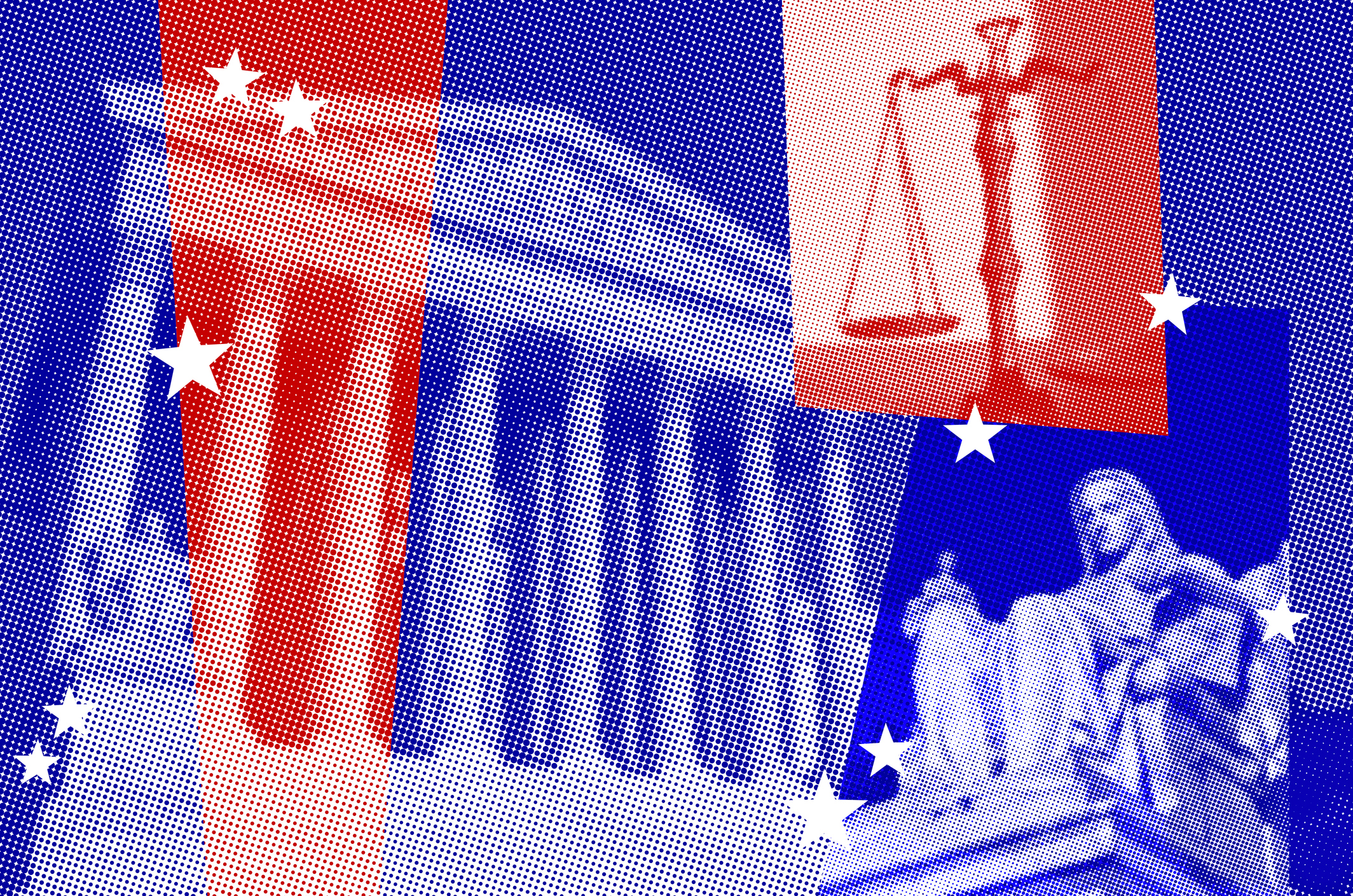Cancel culture and its roots in civil rights law.
Gendered Language

The Supreme Court succumbs to a fatal error in reasoning.
Last month, the Supreme Court declined to review a federal appeals court ruling that would grant certain protections to persons suffering from gender dysphoria under the Americans With Disabilities Act. The decision itself will further entrench “gender identity” as the newest protected category under civil rights law, laying the table for numerous infringements of religious and civil liberties for Americans on the other side of this divide. But there is an even more unsettling and revealing aspect of this case: simply by discussing “transgender persons” as if the term had a stable and meaningful referent, conservative and liberal justices alike revealed that they had accepted a fundamental error in reasoning that threatens to undermine the very heart of American justice and America itself.
This most recent ruling, as well as previous statements made by both U.S. Supreme Court Justices Neil Gorsuch and Ketanji Brown Jackson, suggests a subtle yet catastrophic mistaken assumption about how concepts, language, and meaning fundamentally work. The chief error in their reasoning, which persists within the present transgender debate more broadly, hinges on a fundamental equivocation between the concept of “gender” (in the sense of socially-constructed and therefore publicly determined roles, expectations, and norms of behavior) and “gender identity” (in the sense of in-principle privately determined meaning), both equally denoted and often conflated with one another under the same generic canopy term, “gender.”
Insofar as the meaning of concepts and terms within a given language is irreducibly public, pseudo-claims attempting to make use of “gender” in this second (wholly private) sense fail to even rise to the level of being true or false at all. Such pseudo-claims, failing to meet even the most minimal criteria for public intelligibility or communication, cannot therefore be grounds for any sort of legitimate rights claim whatsoever. Yet this most recent SCOTUS decision tacitly grants further credence and false legitimacy to such wrong-headed attempts.
This error, of conflating socially-constructed “gender” with privately stipulated, publicly opaque, and therefore meaningless “gender identity” (also frequently called “gender”), is at the very root of confusion and perniciousness within this most heated debate.
As Ludwig Wittgenstein pointed out in his Philosophical Investigations, the notion of an in-principle private language or in-principle privately defined word is conceptually impossible. The hypothetical private speaker could simply change the meaning or definition of any given word arbitrarily and at any time, ad infinitum, without any external standard of checks and balances whatsoever to fix such meanings in place, to verify, or to show otherwise. This would then be to have no definition at all.
Contra Humpty Dumpty, who told Alice that a word means “just what I choose it to mean,” it turns out that the meanings of words are actually public, shared, and irreducibly social. They cannot, in principle, be generated at will to meet the private exigencies of any given moment, as Humpty Dumpty—and transgender advocates—assume. Words have both a stipulated definition, an intension (e.g., “a bachelor is an unmarried man”), as well as a referent out in the world, an extension (e.g., “John is a bachelor”). In order to be meaningful, both must be subject to some publicly evaluable criteria. The entire notion of an internally defined “gender identity” or “gender” fails to meet such publicity conditions and is therefore completely meaningless. Take for instance this representative statement concerning “gender fluidity” from Medical News Today: “Genderfluid people may move between different genders throughout their life. Their gender may shift over a day, a week, months, or years.” This statement, which pretends to serve as a definition, actually disqualifies the concept of gender from ever having what would count as a meaning. Anything that can be redefined at will to suit a momentary personal whim is not a word or a concept at all.
This then explains why transgender advocates are so tongue-tied and fiercely reluctant to ever offer any intensional or extensional definition of words like “man” or “woman,” which would then necessarily be subject to public evaluation and deemed true or false. Relational definitions stating that “gender identity” is “related to,” “interacts with,” but is “different from” sex, as well as vacuous or tautologous definitions, that a “woman” is “what I identify as,” likewise function as counterfeit definitions that still miss the mark in saying anything substantive, publicly evaluable, and therefore meaningful.
A Confusion of Tongues
If what SCOTUS means by “transgender persons” is just the set of men and women suffering from a form of dysphoria—where such persons are mistaken, delusional, or have a false (but possibly sincere) belief about their objective sex (strictly speaking “gender” dysphoria is technically a misnomer)—then such persons ought to be regarded as no different in kind from persons struggling with similar cognitive maladies such as anorexia, body dysmorphia, or BIID (body integrity identity disorder). Such persons deserve both our sincere sympathy and respect as fellow human beings as well as proper medical care, if available, to help disabuse them of their delusions. However, the very concepts of proper versus improper medical care, functional versus dysfunctional sex organs, hormone levels, reproductive processes, etc., health versus sickness, and the entire project of medicine itself, rests on the fundamental assumption of there being some objectively discernible and publicly communicable standard to which such concepts are indexed. The use of “gender” in its private sense completely removes any such objective standard and makes it answerable exclusively to a speaker’s opaque and incommunicable subjectivity. Such publicity requirements for meaning likewise apply to indexicals (i.e., pronouns) and so-called “preferred pronouns” and “neo-pronouns” such as Ze and Zir. If what SCOTUS means by “transgender persons” is to conflate the concept of “men and women suffering from dysphoria” with this wholly privately defined, wholly subjective, and fundamentally unintelligible sense of “gender identity” then logical and conceptual complications necessarily abound.
Consider the statement made by Olivia Hunt, who equivocates between these two different senses of “gender” in the following claim:
“By declining to hear this case,” stated Olivia Hunt, policy director for the National Center for Transgender Equality, “The Supreme Court implicitly acknowledges what those who have seriously examined the issue have concluded: the ADA protects people who experience gender dysphoria, including transgender and nonbinary people, from being discriminated against on that basis.
In the clause “including transgender and nonbinary people,” Hunt equivocates between the concept of “gender dysphoria” and this second, unintelligible sense of wholly privately-determined “gender identity.” Having failed to give any publicly evaluable intension or extension of such a referent, Hunt has therefore failed to say anything intelligible at all. Indeed, there are as many transgender and non-binary persons as there are Jabberwockies, slithy toves, and Jub Jub birds.
There are deep and sweeping conceptual complications, systems-wide incoherence, and cataclysmic problems that necessarily result from speakers conflating these two different senses of “gender” and then treating this second sense as meaningful. Intuiting such problems, Justice Samuel Alito noted several “troubling” aspects of this recent SCOTUS decision. He anticipated future complications involving, amongst other issues: women’s sports, the use of traditional pronouns, sex “reassignment therapy,” and adjudicating foreseeable conflicts with religious rights. While Justice Alito’s intuitions are correct, such concerns only begin to scratch the very surface of what complications are necessarily entailed in this decision, what actual rights will necessarily be threatened, and what is truly at stake.
Ironically, by collapsing the definitional intension and extension of “man” and “woman” to each individual speaker’s wholly private subjectivity, transgender advocates also render completely unintelligible interrelated and derivative concepts within the LGBT+ lexicon to include: homosexuals, lesbians, bisexuals, and feminists, as well as the very notions of “transitioning,” “de-transitioning,” “assignment,” “re-assignment,” “identifying as,” and “misgendering.” Indeed, without any public standard of meaning for the terms “man” or “woman,” lesbians, homosexuals, or feminists make no conceptual sense. Persons technically can’t be “mis-gendered” nor even “gender” themselves, and medical interventions aimed at satisfying such standards are rendered wholly unattainable and wholly arbitrary.
Indeed, by attempting to remove any and all public standard of meaningfulness for the definitions of “man” and “woman,” transgender advocates (and now apparently members of SCOTUS) necessarily subordinate all other interrelated terms, definitions, and meanings (and the laws that make use of them) to complete and utter nonsense. Orwell’s “2+2=5” was false but at least meaningful. Pseudo-claims involving “gender identity” aren’t even that.
Even assuming, charitably, that they are motivated by genuine compassion for persons suffering from actual dysphoria and deeply confused about language and meaning, the fact remains that transgender advocates and now several members of SCOTUS are attempting to gerrymander all of language, law, and the entirety of the institutional world in order to satisfy a set of in-principle unintelligible and logically impossible demands. These muddle-headed dictates will necessarily run roughshod over the actual rights of everyone else. Already in Canada we are witnessing ever more rights violations in the name of a “gender identity rights bill” (Bill C-16). America’s fate, if not interrupted, will be predictably similar.
We do persons suffering from the medical condition of dysphoria no good whatsoever by further enabling their cognitive errors and delusions, nor do we help them in any way by attempting to strong-arm the rest of society into denying biological reality and logic itself in an attempt to accord with an inexpressible and unintelligible standard. In so doing, we only harm such persons and all of the rest of society in the process. The consequence of allowing pseudo-claims involving the nonsensical concept of “gender” to be codified into official U.S. law will not only be to violate citizens’ actual rights but to sanction nothing less than the abolition of men, women, and truth itself.
The American Mind presents a range of perspectives. Views are writers’ own and do not necessarily represent those of The Claremont Institute.
The American Mind is a publication of the Claremont Institute, a non-profit 501(c)(3) organization, dedicated to restoring the principles of the American Founding to their rightful, preeminent authority in our national life. Interested in supporting our work? Gifts to the Claremont Institute are tax-deductible.
Are we ready to face what colorblindness would really look like?
Curbing censorship will require a full-scale assault on the surveillance state.



